General
Why Not Uganda? Asks Amb Haskel on Farewell Visit to Mak
Published
12 years agoon
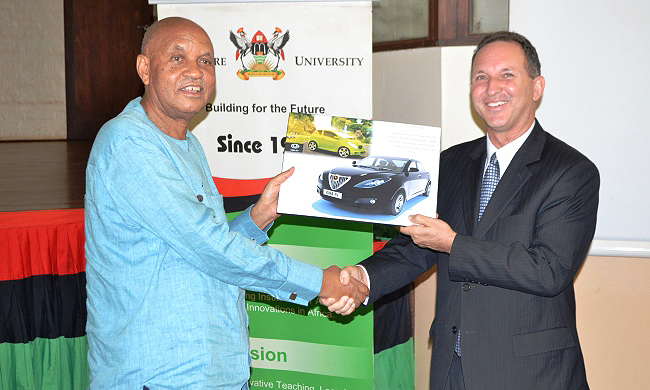
The Israel Ambassador to Kenya, Uganda, Tanzania, Malawi and Seychelles H.E. Gil Haskel paid a farewell visit to Makerere University as part of his end of duty visit to Uganda from 13th to 15th July 2014. Accompanied by his wife Mrs. Dalit Dassa Haskel, the Ambassador Haskel paid a courtesy call on the Vice Chancellor, Prof. John Ddumba-Ssentamu in his office on 14th July 2014, where he also met with the Chancellor, Prof. George Mondo Kagonyera, the Chairperson Council, Eng. Dr. Charles Wana Etyem, Representative to the Minister of Education and Sports and the Principal, College of Veterinary Medicine, Animal Resources and Biosecurity (CoVAB) Prof. John David Kabasa.
In his remarks, the Vice Chancellor Prof. Ddumba-Ssentamu thanked the Ambassador for including Makerere University on his farewell visit to Uganda noting that this was a true testament to the to the value the Government and people of Israel attach to academia and indeed to Makerere University.
”We sincerely thank H.E. Ambassador Gil Haskel for his personal contribution to the success of the Agrostudies Internship at Makerere University and the Nation. This internship has not only grown but also flourished under your term of office,” said the Vice Chancellor in reference to the Agrostudies International Internship program increasing Uganda’s internship slots from 41 to 192.
Speaking on behalf of the College of Agricultural and Environmental Sciences (CAES) which was the flagship college for the Agrostudies Internship, Prof. John Muyonga-Dean, School of Food Technology, Nutrition and Bioengineering on behalf of the Principal Prof. Bernard Bashaasha reiterated the Vice Chancellor’s statement, “We are happy Your Excellency that in the College of Agricultural and Environmental Sciences, where we only had two programmes participating last year, we are going to have a total of five programmes participating this year.”
Prof. Muyonga also expressed pleasure that more Colleges like CoVAB as well as other Institutions were also participating in the programme. “This is indeed the way to make the programme actually deliver for the country,” he added. He further appreciated the value that the Internship added to all the theory the students learnt, noting that the College looked forward to interacting with even more institutions to mainstream skilling of its students.
As an outcome of the Makerere University Job Evaluation Task Force’s benchmarking visit to Israel from 17th to 20th July 2012, the University signed a Memorandum of Understanding with Bar-llan University, Israel on 5th April 2013. The Principal, College of Natural Sciences (CoNAS) Prof. JYT Mugisha appreciated Bar-Ilan University’s advancement in nano technology, computational sciences, astrophysics, biotechnology and bioengineering and hoped that the partnership would help broaden research cooperation in those disciplines.
“The College of Natural Sciences has written a project through which we can holistically partner with Bar-Ilan University. The project is aimed at bridging the Science, Technology, Engineering and Mathematics (STEM) gap in the rural and urban High Schools, also incorporating gender aspects,” said Prof. Mugisha. “We hope that this project can be taken up under the Presidential initiative so that together with Bar Ilan University, we can popularize sciences in Uganda with the anticipation of a big boost to the number of science students in the next eight years,” added the Principal CoNAS.
On behalf of the Makerere University Job Evaluation Task Force, Mr. George Piwang Jalobo who served as the Research Fellow on the same body borrowed a leaf from his theological background to illustrate how Israel’s use of modern technology to turn desert and wilderness into Eden was prophesied by Isaiah 51:1-3.
“If Israel could turn desert and wilderness into lush agricultural land, what could their skills and competence do to the fertile well-fed soils that we have in Uganda?” he pondered. “The trick and the key is in the hands of you the students that are going as agricultural evangelists to Israel to be trained to transform Agriculture in Uganda,” Mr. Piwang encouraged, further adding “That is the vision of His Excellency the President to transform agriculture in Uganda as embodied in Vision 2040 and you are the change agents. You are the cadres of agricultural modernization and transformation in Uganda. Don’t waste that opportunity.”
Speaking on behalf of CoVAB, the latest college to join the Agrostudies programme, The Principal Prof. John David Kabasa appreciated the timeliness of the Internship, noting that by 2040, it was envisaged that about 1billion people would be living in Cities of this region and would require safe and healthy animal products.
“Foot and mouth disease is one of those that can paralyze animal production. When this initiative came up, there was an opportunity to write a joint framework with partners from Ben-Gurion University of Negev-Israel, the US and Uganda Virus Research Institute to identify strains of the virus and come up with a vaccine to cordon it off. If we are able to do that, trading with Israel and other countries will be okay, and we hope, Your Excellency, that this programme will help to catalyse this initiative beyond other diseases which are also affecting the business,” stated Prof. Kabasa.
Mr. Agaba Issa Mugabo the Agrostudies Coordinator for East and Southern Africa thanked the Ambassador for his support to the Agrostudies Internship programme at Makerere University and always making personal follow-ups on the Students’ progress. He also prayed that the Ambassador would through his new office consider rounding off the Ugandan Internship slots to 200.
“Your Excellency, out of the 192 slots, we have interviewed close to 300 students from the five Institutions; Makerere University, Kyambogo University, Bishop Stuart University-Mbarara, Busoga University and Bukalasa Agricultural College, and we have shortlisted about 230 with only 8 slots for girls. Uganda is a gender-sensitive country and our prayer is that in your new capacity as Head of MASHAV, you will not only increase our total slots to 200 but also increase the slots for females,” advocated Mr. Mugabo.
Out of the 192 slots confirmed by Agrostudies, 25 have gone to CAES, 40 to CoVAB, 20 to Kyambogo University, 32 to Busoga University, 15 to Bishop Stuart University and 60 to Bukalasa Agricultural College.
In his remarks, the Chairperson University Council, Eng. Dr. Charles Wana Etyem commended Ambassador Haskel for his keen interest in Makerere as demonstrated by his record-holding visits. “In the long and distinguished history of Makerere University, H.E. Gil Haskel indeed holds his own record not only as the first Israeli Ambassador but also the first foreign envoy ever to have visited Makerere University three times within a space of less than one and a half years. We pray that you may continue to break many more records here at Makerere University, especially as you take on your new assignment back home in Israel,” said the Chairperson Council.
Eng. Dr. Wana Etyem further appreciated the Agrostudies Programme, as an opportunity for Ugandans to not only receive practical skills in the sciences but also change the mindset and attitude of students towards agricultural work and productivity. He prayed that any issues emanating from the programme which was approved by the Senate and endorsed by the Council would be appropriately handled without creating any anxiety on the part of any party.
In Reading the Minister of Education and Sports, Hon. Jessica Alupo’s remarks, the Minister’s representative expressed her appreciation to Ambassador Haskel on the progress of the partnership thus far “Your Excellency, the Government of Uganda is pleased that the Memorandum of Understanding between Makerere University and Bar Ilan University and the Agrostudies Agricultural Internship towards modernization of agriculture in Uganda and future collaborations with other Israeli Universities and Institutions are all geared towards promoting and scaling up the Presidential Initiative for Science, Technology and Innovations,” read the representative.
“The Honourable Minster of Education and Sports also recommended to the Chancellor Prof. George Mondo Kagonyera to inaugurate H.E. President Yoweri Museveni as the Patron of the Presidential Initiative for Science, Technology and Innovation in Makerere University, as a Ugandan homegrown centre of excellence in Science Technology and Innovation in Africa,” he added. This has been proposed to take place in October 2014, as part of Uganda’s 52nd Independence Celebrations, in recognition of President Museveni being the first African Head of State to set up the Presidential Initiative in 2010/11 as a National Science, Technology and Innovation fund at Makerere in the context of the African Science, Technology and Innovations Consolidated Action Plan as approved by the African Union Heads of State in 2006.
In appreciation of the warm welcome that had been extended to His Embassy and all Israeli Nationals that had visited Makerere University, H.E. Ambassador Gil Haskel remarked that it was a huge honour for him to break the record by being the first foreign envoy to visit Makerere University three times in a space of less than one and a half years “But I think in return Uganda also broke a record in being the first Country to elevate the number of students to almost 200 in the second year. So we are now equal in terms of record breaking,” remarked Ambassador Haskel amidst applause from the audience.
The Ambassador expressed his pleasure at being invited to address a distinguished audience which included the largest batch of students ever to be sent on Internship from Uganda to Israel. He however challenged the students to ask themselves one simple question ‘Why Not?’ in reference to why agro-technology and agricultural farming should not elevate itself in Uganda to the exact same level as it is in Israel.
“That question ‘Why not?’ should lead you in your future endeavours after you come back, because the whole idea of this programme is to allow our good friends in Uganda to adopt and adapt the technologies exercised in Israel. We are 66years old while Uganda is 52years old. We are not very much apart in age and so what we achieved in Israel can be achieved in Uganda,” challenged Ambassador Haskel.
Addressing the gathering at the Chief Guest-Executive Director, Uganda Industrial Research Institute and Senior Presidential Advisor on Science and Technology, Prof. Charles Kwesiga noted that Uganda has a lot to learn from Israel which has debunked all theories, notions and even excuses that we give for our own slow pace of development. “Talk about political strife, they are never at peace; Israel is faced with intermittent wars and an implacable enemy that seeks its destruction and the economy is continuously strained by having to spend more per capita on its own protection than any other country in the world,” he noted.
Prof. Kwesiga further challenged Africa not to use brain drain as an excuse because Israel, despite having many people of Jewish origin living outside her borders has still managed to produce many award winning innovations including Nobel Laureates “But how do they do it?” pondered The Chief Guest, before hastening to answer, “Israel manages to inspire its citizens and all the people of the Jewish faith to always think about and contribute to the betterment of their homeland.” In the same vein, The Chief Guest decried the mockery made by Ugandans in the Diaspora of their own country, noting that such tendencies would only serve to hold us back.
Turning to the Internship-bound students, Prof. Kwesiga challenged “Israel has the highest ratio of University degrees to the population in the world. Israel produces more scientific papers per capita than any other nation by a large margin. My young students, why not cooperate and collaborate with a success story like Israel? On a per capita basis, Israel has the largest number of biotech startups. So as you go for Agrostudies, be on the lookout. You can learn a thing or two,” said Prof. Charles Kwesiga.
The Chief Guest prayed that Ambassador Gil Haskel would continue with the good job of promoting collaboration between Ugandan and Israeli institutions and of enhancing even further the bilateral operations. He also appealed to the audience to take advantage of this goodwill from Israel so that Uganda can leapfrog some of her own problems.
Appreciating the Government of Israel’s contributions to Uganda and Makerere, The Chancellor Prof. George Mondo Kagonyera presented H.E. Ambassador Gil Haskel with a souvenir. “Therefore Your Excellency, in appreciation of your support to the Kiira EV project and furtherance of the Project’s collaboration with the Israel Government, Scholarship and Private Sector, it is our pleasure and privilege to give you this small souvenir so that you can still remember that there is such a thing as the Kiira EV project,” said The Chancellor, thereafter encouraging the audience to visit the Centre for Research in Transportation Technologies (CRTT) Ntinda premises. “We have to learn to love our country especially you the young people. Get genetically engineered so that you can have a change of attitude. Choose to be different,” added the Chancellor.
In moving a vote of thanks to the Chief Guest the Vice Chancellor Bishop Stuart University (BSU) and former Dean, School of Biosciences, CoNAS, Dr. Maud Kamatenesi appreciated Prof. Charles Kwesiga for his stimulating and inspirational address that had rallied students to go out and do their best. She thanked the Makerere University Council and Management for always mentoring and reaching out to BSU; the Agrostudies Internship being one of the avenues. She gave glory to God for the Nation of Israel’s inspirational example to the rest of world in Science, Technology and Innovations.
Article by Public Relations Office
You may like
General
Advert: Admissions for Diploma/Degree Holders under Private Sponsorship 2026/27
Published
5 hours agoon
March 5, 2026By
Mak Editor
The Academic Registrar, Makerere University invites applications from Ugandan, East African and international applicants for the undergraduate programmes under the private sponsorship scheme for the 2026/2027 Academic Year.
Each applicant should:
EITHER
Hold at least a Second Class/Credit (or equivalent classification) Diploma or otherwise as specified in the Diploma Holders’ requirements from a recognised chartered institution, relevant to the programme applied for. Certified copies of academic transcripts and certificates (not photocopies of certified copies) from the awarding institutions and one passport size photograph must be submitted to Office 315 level three (3) Senate Building after applying online.
OR
Be a Graduate from a RECOGNISED CHARTERED UNIVERSITY. Certified copies of academic transcripts and certificates (not photocopies of certified copies) from the awarding Institutions and one Passport size photography MUST be submitted to Office 315, Level three (3) Senate Building after applying online.
N.B. Applicants will be responsible for verification of their academic documents from the awarding Institutions after admission.
Other relevant information can be obtained from UNDERGRADUATE ADMISSIONS OFFICE, LEVEL 3, SENATE BUILDING OR CAN BE found on the University Website.
Diploma Holder applicants who hold class three (3) diploma certificates or Pass Diplomas are not eligible for admission and therefore should not apply, except where stated in the Diploma Holders requirements.
HOW TO APPLY
Applications shall be submitted online using the ACMIS system for all applicants. Diploma/degree holders and internationals will have to submit certified copies of their transcripts and certificates and a passport size photograph to Office 315, Level 3, Senate Building after submitting the application online and payment of application fees.
Details of the Diplomas required for each programme are in the document attached below, the same list can be found here: https://mak.ac.ug/how-apply/diploma-holders-application-guide
OTHER RELEVANT INFORMATION CAN BE OBTAINED FROM UNDERGRADUATE ADMISSIONS OFFICE, LEVEL 3, SENATE BUILDING, MAKERERE UNIVERSITY WITH EFFECT FROM 5th JANUARY, 2026.
A NON-REFUNDABLE APPLICATION FEE OF SHS.55,000/= FOR UGANDAN AND EAST AFRICAN APPLICANTS OR $76.5 OR EQUIVALENT FOR INTERNATIONALS, (UGX.286,250=) PLUS BANK CHARGEs SHOULD BE PAID IN ANY OF THE BANKS USED BY UGANDA REVENUE AUTHORITY (URA)
CANDIDATES WHO HOLD GRADES X, Y, Z, 7 AND 9 OF ‘O’LEVEL RESULTS SHOULD NOT APPLY BECAUSE THEY ARE NOT ELIGIBLE FOR ADMISSION.
ONLINE APPLICATION PORTAL USER GUIDE
Applicants should access the Institution’s Admissions URL https://apply.mak.ac.ug
- Signup using full name, e-mail and Mobile Number. Please note that your name must be similar to the one on your supporting academic documents for your application to be considered valid. If you changed your names please go to Senate Building Office 611 with a deed poll and gazette supporting the name change.
- A password will be sent to both your e-mail and mobile number.
- The system will prompt you to change the password to the one you can easily remember.
- To fill a form (all form sections must be filled)the applicant clicks on the APPLY NOW button displayed on the running scheme.
- Obtain a pay reference nunber(PRN) after submitting the application.
- Make a payment at any of the banks used by Uganda Revenue Authority.
MOBILE MONEY PAYMENT STEPS:
1. Dial *272*6# on MTN or Airtel
2. Select option 3-Admission
3. Select option 3 Pay Fees
4. Enter reference number obtained from Application portal
5. Details of Application form will be confirmed
6. Enter PIN to confirm payment
The closing date for receiving applications was extended to Friday 13th March, 2026.
General
Call for Applications: Diploma Holders under Government Sponsorship 2026/2027
Published
6 hours agoon
March 5, 2026By
Mak Editor
The Academic Registrar, Makerere University invites applications from Diploma Holders only for admission under the Government Sponsorship Scheme (not exceeding 5% of the intake capacity) to the University Degree Programmes for the 2026/2027 Academic year listed in the document attached below.
- Each applicant should possess at least a Credit or Second Class or equivalent Diploma in a relevant field from a recognised Institution plus a Uganda Certificate of Education (UCE) with at least 5 Passes (or its equivalent) and a Uganda Advanced Certificate of Education (UACE) with at least One Principal Pass and Two Subsidiary Passes obtained at the same sitting (or its equivalent).
- A non refundable application fee of Shs.55,000/ = (Fifty five thousand shillings only) excluding bank charges using an ACMIS Pay Reference Number should be paid to any bank used by URA before submitting a system generated application form to the Admissions Office, Room 315 Level 3, in the Senate Building, Makerere University.
- Certified copies of Diploma Transcripts (not photocopies of certified copies) from the awarding Institutions must be attached to the application forms. Incomplete application forms shall not be processed.
- Details of the Diplomas required for each programme are in the document attached below, the same list can be found here: https://mak.ac.ug/how-apply/diploma-holders-application-guide
- N.B. Applicants will be responsible for verification of their academic documents from the awarding Institutions.
- Each applicant should also attach a copy of the Birth Certificate to the application form.
The closing date for returning the system generated application forms and certified copies of the academic documents to the University was extended to Friday 13th March, 2026.
General
Makerere Explores Strategic Industry Partnership with Psalms Food Industries to Strengthen Manufacturing Innovation
Published
23 hours agoon
March 4, 2026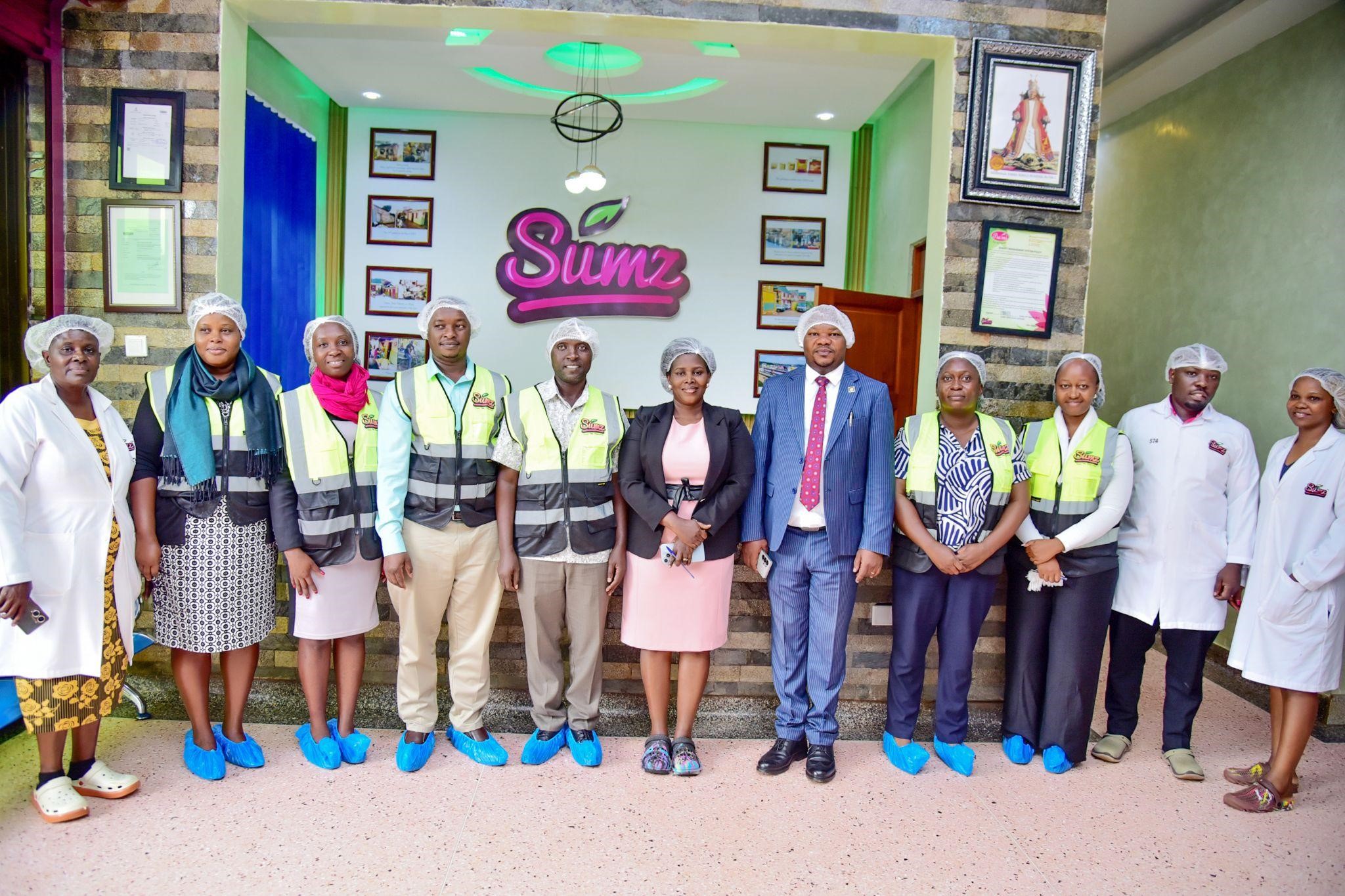
On 2nd March, 2026, representatives from the Advancement Office, the College of Business and Management Sciences and the University Innovation Pod visited Psalms Food Industries to discuss a prospective partnership aimed at strengthening university–industry collaboration in manufacturing, research, innovation, and skills development.
Psalms Food Industries, a homegrown snacks innovation and manufacturing company, operates three major brands, namely, Sumz, Afrikan Harvest and Krunchables, which have grown to a range of 37 products and target the introduction of five new products annually. The company distributes products across Kenya, Rwanda, the Democratic Republic of Congo, South Sudan, and, recently, Tanzania. As a labour of love, the idea of producing snacks was born during the honeymoon of Mr and Mrs Ngabirano, who now run Psalms Food Industries side by side.
Dr. Denis Ngabirano, CEO and Co-Founder of Psalms Food Industries, during the meeting, described the company as “a snacks innovation house, with all our products developed in-house.” He noted.
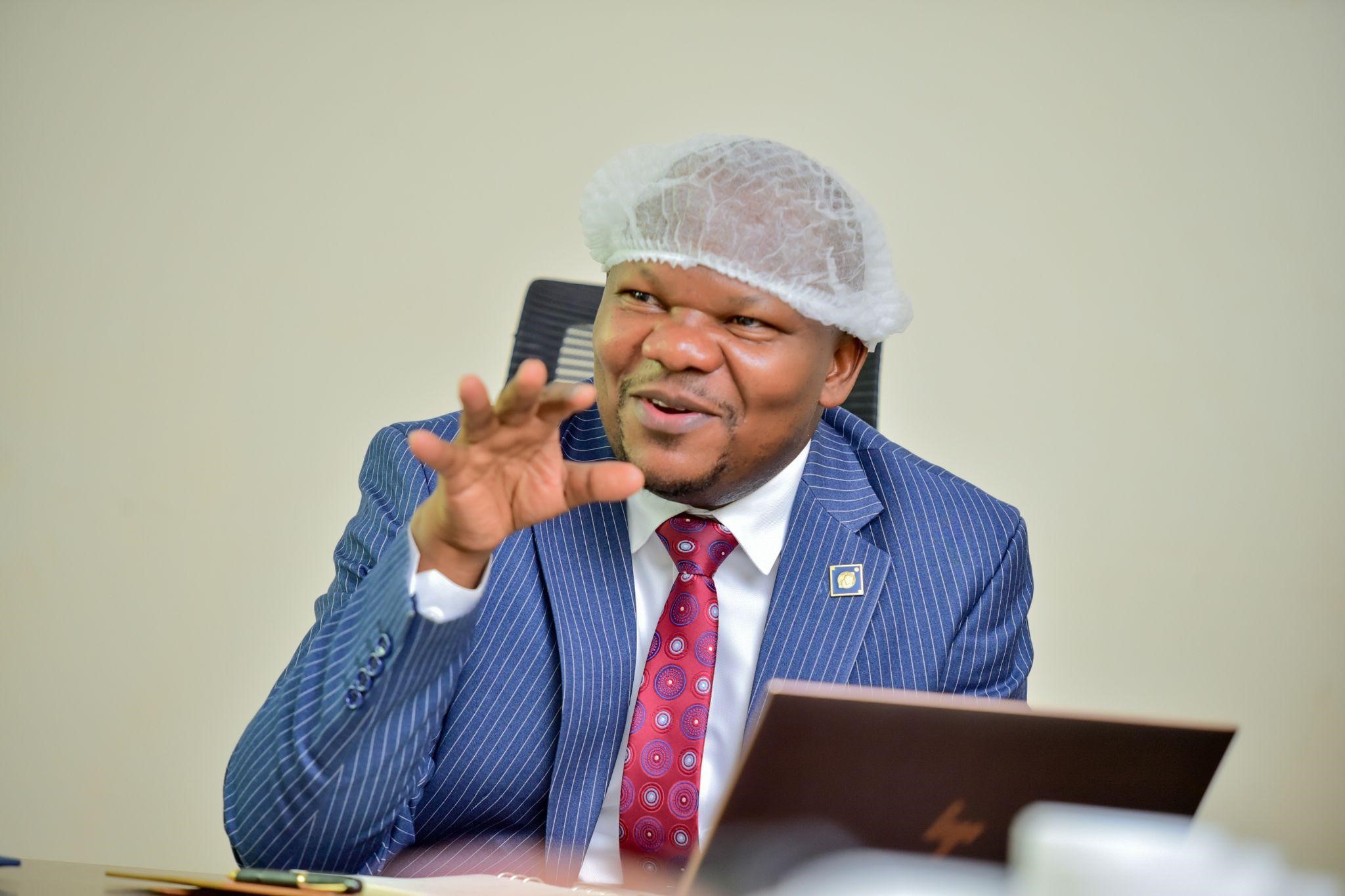
He emphasised the company’s commitment to quality assurance and consumer-centred research, noting that Psalms conducts surveys and gathers customer feedback to inform product development, supported by an internal microbiology and chemistry laboratory.
Dr. Denis Ngabirano noted that the company had only recently introduced two brands, “Afrikan Harvest for it’s health conscious clientele and Kruchables for it’s volume centric clientele.
“Afrikan Harvest has no additives, it is a brand for health-focused consumers,” he explained, while highlighting the differentiated positioning of their product lines. “Sumz is our premium brand, and Krunchables focuses on volume.”
Student-Centered Experiential Learning
A key focus of the meeting was structured experiential learning for students across disciplines. Potential areas of collaboration include internships, graduate trainee pathways, and hands-on exposure within Psalms’ incubation and production facilities.
The proposed engagement spans multiple fields, including environmental sciences, engineering, procurement and logistics, finance and accounting, quality control, production and manufacturing, human resource management, marketing, and international business.
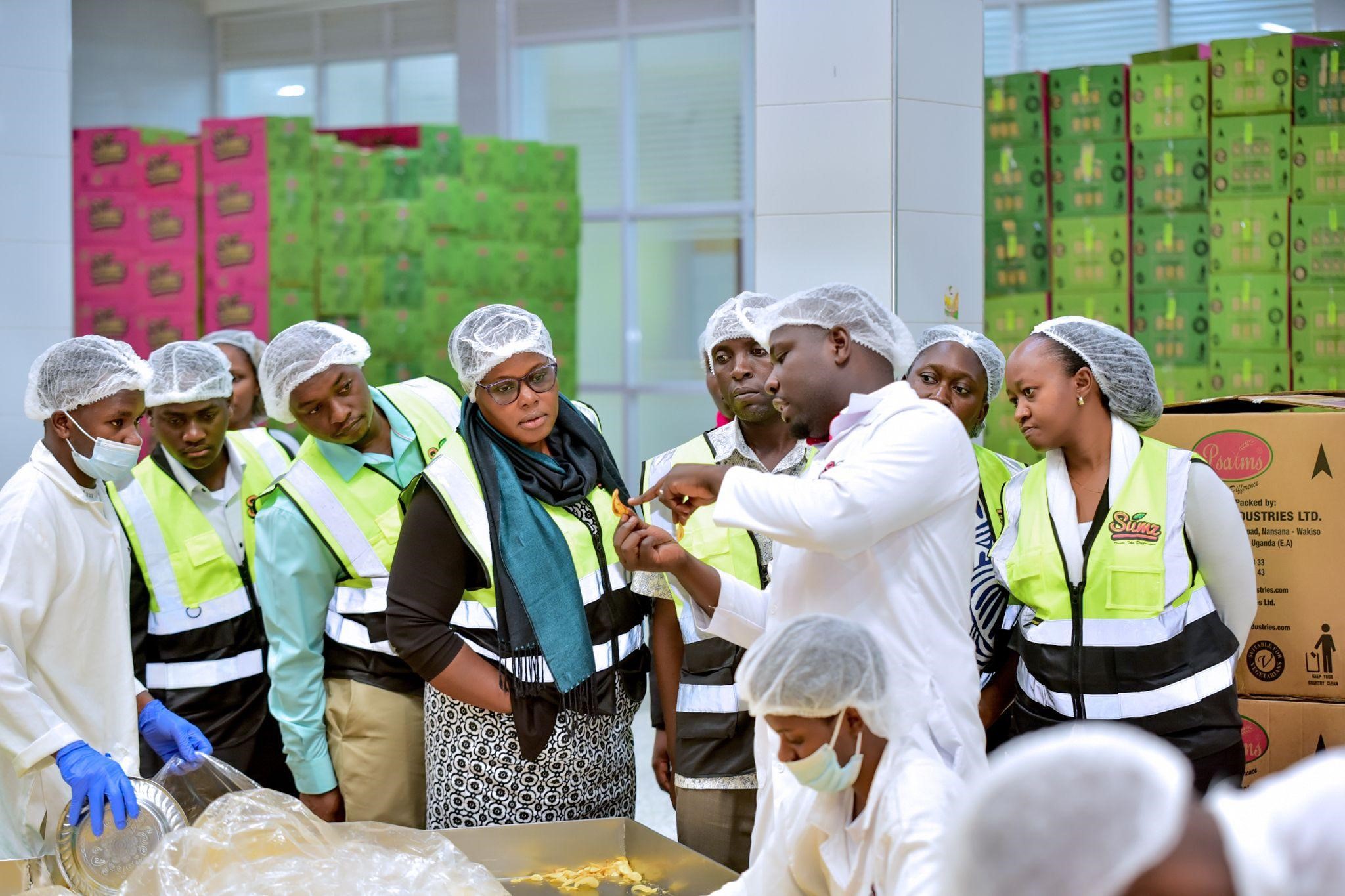
The partnership could provide students with direct exposure to real-time production systems, standard operating procedures (SOPs), and quality assurance frameworks, strengthening the practical relevance of their academic training.
Among the innovative ideas discussed was a potential competition involving students from the Fine Art and Industrial Design disciplines to redesign packaging for selected Sumz products. The proposal would allow top designs to be commercially adopted, creating a direct bridge between creativity, intellectual property development, and industrial application.
Research, Innovation and Commercialisation
Both institutions expressed interest in joint applied research initiatives, particularly in process optimisation, data analytics for manufacturing efficiency, product improvement, and sustainable production systems.
Opportunities were also discussed around collaborative research in machine design, crop development for snack processing, and factory energy solutions, areas that not only benefit Psalms but have broader implications for Uganda’s manufacturing sector.
The engagement further highlighted potential linkages with the University’s innovation and commercialisation structures, including the University Innovation Pod (UNIPOD), to support co-creation and scaling of student-led innovations.
Mr Awel Uwihanganye, Chief Advancement Officer at Makerere University, proposed strengthening the engagement through structured programming, including a planned collaboration between the University’s innovation Hub and the upcoming incubation Hub at Psalms Food Industries, particularly to support the commercialisation of research outcomes for both students and staff.
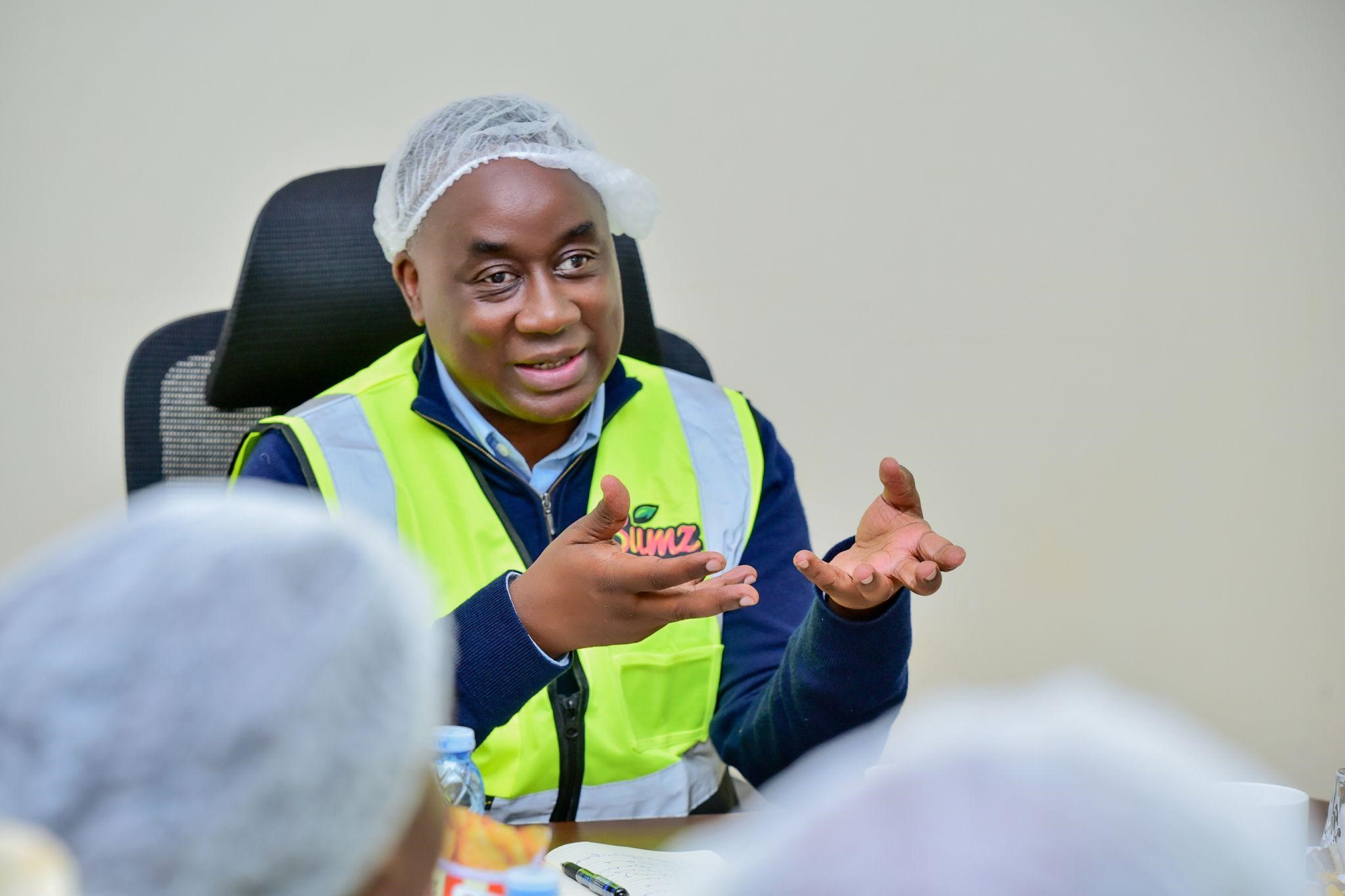
Curriculum Co-Creation and Staff Exchange
Beyond student placements, discussions also focused on co-developing academic content that responds more directly to industry needs, particularly within the manufacturing value chain.
Proposals included guest lectures by industry practitioners, staff exchange programmes to expose academic staff to factory operations, and tailored short courses for Psalms staff based on identified skills gaps.
Dr. Jude Mugarura, Head of the Department of Marketing and Management at COBAMS, emphasised the importance of embedding the partnership within academic programming. He proposed “internships for students in HR, marketing, international business, accounting and finance,” as well as staff exchanges to give University staff hands-on exposure to manufacturing operations.
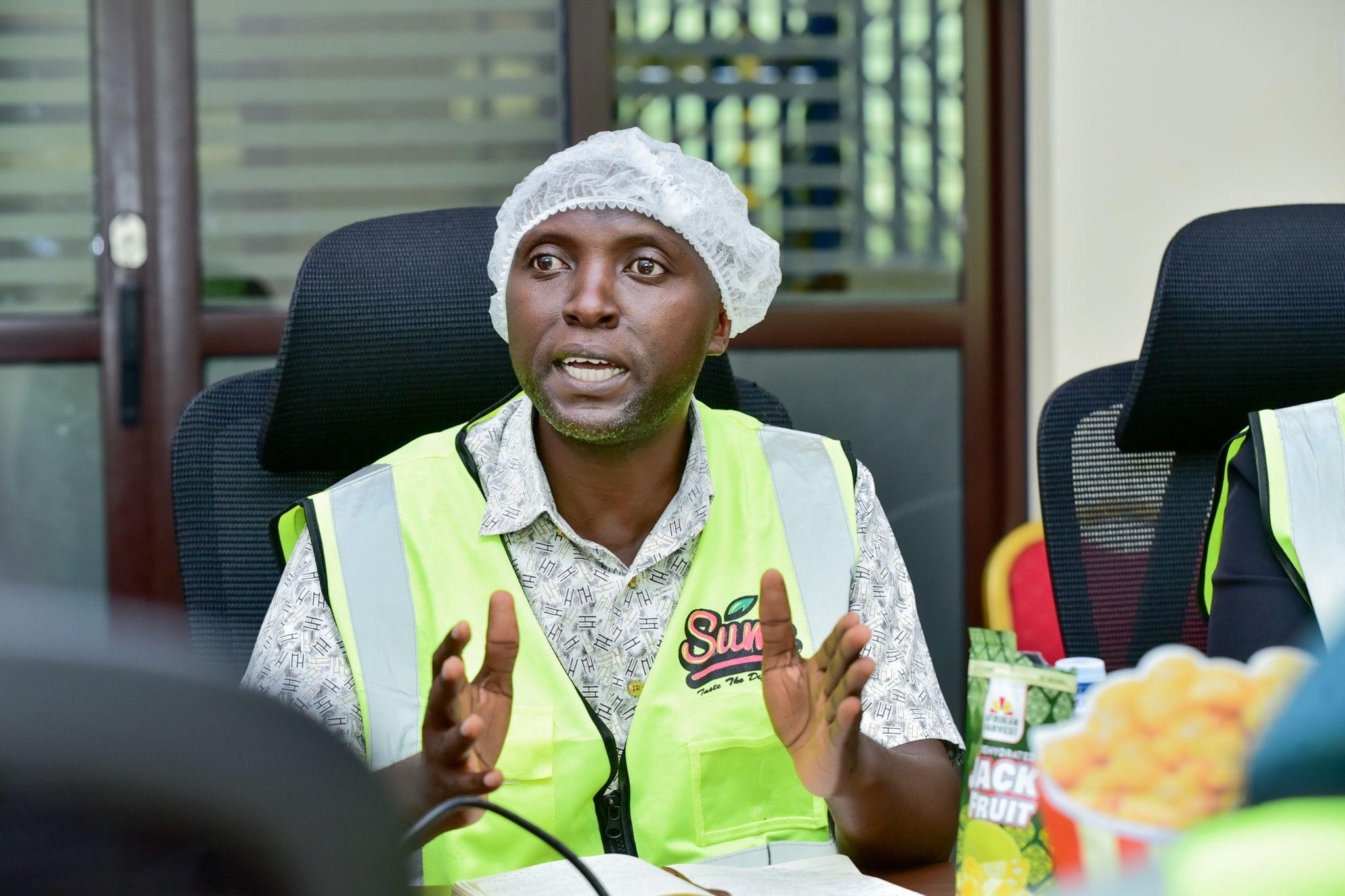
He further suggested specialised courses tailored to the factory’s needs and attachment of research students interested in manufacturing. Such collaboration would contribute to curriculum responsiveness and ensure that graduates are equipped with market-relevant competencies.
Strengthening University–Industry Linkages
The engagement reflects Makerere University’s continued commitment to strengthening partnerships that bridge knowledge generation and real-sector application.
Both institutions expressed a shared vision of building a structured, mutually beneficial collaboration that integrates research, innovation, skills development, and enterprise growth, positioning the University as a key knowledge partner in Uganda’s manufacturing transformation.
Discussions remain ongoing as both parties refine priority areas for formalisation.
Caroline Kainomugisha is the Communications Officer, Advancement Office.
Trending
-

 General6 hours ago
General6 hours agoCall for Applications: Diploma Holders under Government Sponsorship 2026/2027
-

 General5 hours ago
General5 hours agoAdvert: Admissions for Diploma/Degree Holders under Private Sponsorship 2026/27
-

 Humanities & Social Sciences1 week ago
Humanities & Social Sciences1 week agoMeet Najjuka Whitney, The Girl Who Missed Law and Found Her Voice
-

 General1 week ago
General1 week ago76th Graduation Highlights
-

 Agriculture & Environment2 weeks ago
Agriculture & Environment2 weeks agoUganda Martyrs Namugongo Students Turn Organic Waste into Soap in an Innovative School Project on Sustainable Waste Management
